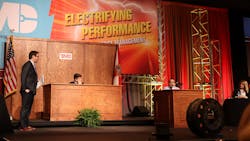Mock trial demos depth of truck wheel-off liability
Attendees of the recent annual meeting for American Trucking Associations’ Technology & Maintenance Council (TMC) were treated to a mock trial that was both entertaining and informative. Of course, I may be biased because I played the expert witness for the plaintiff, Dr. Ned Hackley.
Hackley grew up driving trucks on his uncle’s farm before going off to college to earn a master’s degree in engineering and then a PhD in sociology. Since they also performed their own repairs, Hackley claimed to have extensive experience in vehicle maintenance.
The premise was simple. A fleet performed a brake job, a tire dealer “skinned” the outer tire of the wheel end that was installed by the fleet, and then a wheel-off accident occurred. The loose tire and wheel assembly struck a car driving in the opposite direction, seriously injuring the driver and totaling her vehicle and damaging several other vehicles in the accident. It was a million-dollar case because the injured party suffered severe and potentially permanent disabilities.
Plaintiff’s allegations against the fleet hinged on the fact that there were inconsistencies in the procedures that were followed and the training that maintenance personnel received. While the defense witness for the fleet outlined the TMC recommended practices that were followed as well as the basic components of their wheel installation/torque program, there was no disputing the fact that the fleet was the last one to touch the wheels.
See also: Wheel-off watchers are watching
For the tire dealer, Hackley pointed out that “skinning” a tire (demounting and mounting without removing the wheel from the axle) does not follow the standard of care for a tire repair. Various industry organizations recommend inflating the tire in a restraining device (safety cage) so it can be inspected for a zipper rupture, which means it must be removed from the axle. The defense expert for the dealer pointed out that Occupational Safety and Health Administration (OSHA) allows a single-piece assembly to be inflated on the vehicle if the lug nuts are fully tightened, and there are no industry recommendations that specifically prohibit the practice.
Accusations against the wheel and hub manufacturers were based on the claim that hub-piloted wheel systems are defective. Hackley offered convincing testimony on how they are inferior and dangerous. Defense witnesses for the wheel and hub manufacturers clearly pointed out that hub-piloted systems comprise over 99% of new commercial wheels, and there are numerous quality control mechanisms in place to ensure the strength of the aluminum alloys, which eliminates the possibility of “soft metal” being used in the components.
With an obviously biased jury pool of maintenance professionals, the accusations against the manufacturers were quickly dismissed. However, in a real trial, the outrageous and inaccurate claims by Hackley would definitely play a more significant role in the minds of jurists, who know little to nothing about trucks. Likely, the manufacturers would settle before the case ever made it to court, so the plaintiff can focus on the fleet and the dealer, which isn’t uncommon. Ultimately, the jury ruled that the fleet must assume 100% of the liability because they were the last one to touch the wheel.
The TMC mock trail exemplified what happens after an accident. Every party that is even remotely involved in the fact pattern will be brought into the civil litigation. The expert(s) for the plaintiff will make a wide variety of claims, some legitimate and some not. Manufacturers generally settle out quickly to avoid defense costs, which often leaves the fleet and the tire dealer holding the bag. If the case ever makes it to trial, the jury will determine who is at fault. Experts will opine and lawyers will argue, but six to 12 people will consider all of the testimony before rendering a decision.
When the plaintiff is severely injured or mourning the loss of a loved one, there must be restitution in the eyes of most jurors. It’s human nature to sympathize with someone who is disabled or distraught as the result of an accident, so the unpredictable nature of a jury must always be considered in the decision to go to trial or settle out of court. Even if the facts suggest that a defendant did nothing wrong, it’s rare for a corporate entity to be absolved of all responsibility. The TMC mock trial demonstrated how liability cannot be eliminated; it can only be controlled by following industry recommended practices and guidelines.
Kevin Rohlwing is the SVP of training for the Tire Industry Association. He has more than 40 years of experience in the tire industry and has created programs to help train more than 180,000 technicians.
About the Author
Kevin Rohlwing
Kevin Rohlwing is the SVP of training for the Tire Industry Association. He has more than 40 years of experience in the tire industry and has created programs to help train more than 180,000 technicians.
